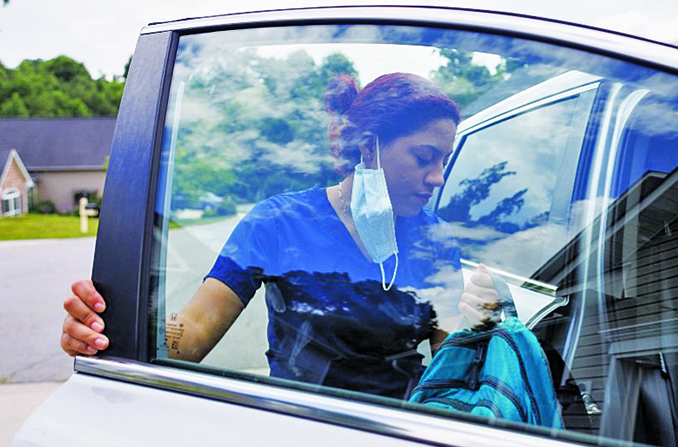COVID burnout for frontline workers is real. For some, faith has been one of the most effective antidotes, however.
Anjelika Ortiz, a registered nurse who lives and works in Western North Carolina, has been on the front lines with COVID-19 for more than two years now.
She compares it to a war zone. She has seen a lifetime’s worth of death and family heartbreak and witnessed many of her colleagues quit from “combat fatigue.”
“We have lost many people with many years of experience,” she said of nurses leaving the field. “After two years of physical and emotional stress, some just can’t take it anymore.”
When coronavirus variants began to surge in 2021, registered nurse Josie Rodas of Long Island, New York suffered flashbacks to the early beginnings of the pandemic.
At the time, Rodas was working on the COVID floor of her hospital. Sweating profusely under her personal protective equipment and often without time to eat, she rushed to help one patient after another.
Death still won the battle most days. At home, she slept alone out of fear of asymptomatically infecting her husband.
“I was just so low,” she said.
Then her mother, who lives alone, contracted the virus. Desperate to help but needing to stay safe, Rodas constantly monitored a remote camera for the rise and fall of her mother’s chest—a sign that her mom was still breathing.
Ortiz and Rodas credit their common faith as Jehovah’s Witnesses for helping them and other health care workers in their religious community endure the grinding toll of the pandemic.
“Thinking about God and his promises in the Bible gives me a positive feeling,” Rodas said. “I don’t focus on what I might walk into when I go to work.”
She prays regularly and leans on fellow believers for support.
“If they see that I am down, they really cheer me up,” she said. “It’s because of God and all of their efforts that I have the strength to keep on going.”
American psychological and psychiatric associations, while not advocating or endorsing any specific religion, acknowledge the role spirituality and religious faith can play in coping with distress and trauma.
Lawrence Onoda, Ph.D., a clinical psychologist in Mission Hills, California, noted some ways spirituality can help, including giving people “a positive hope and meaning toward life, comfort by looking for answers and strength from a higher power and a collective shared experience of support and community.”
Ortiz agrees. She points to her faith as a source of strength for coping with the suffering and death she sees at her job. Personal Bible study helps her to build faith in the Bible’s promise for a better future.
“I pray for peace and tranquility when I’m at work, “ Ortiz said. “I think about a time when sickness and death will be eliminated from the earth. I know I will be out of a job, but what could be sweeter?”
Ortiz finds joy in passing along to others what has helped her. She joins friends online to write or call people in the community with a message of hope from the Scriptures.
One favorite resource for both Ortiz and Rodas is jw.org, the official website of Jehovah’s Witnesses, with its collection of practical articles like “How to Beat Pandemic Fatigue” and short videos such as “The Resurrection – Soon a Reality.”
“I’m so grateful for the website,” Rodas said. “The articles and the experiences are exactly what I need and I find them encouraging and helpful.”

